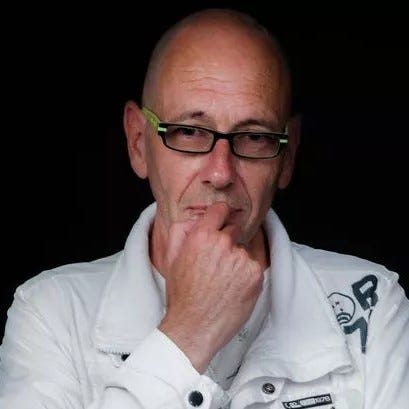Tête-à-Tête. Or, Tate-a-Tate?
The "Manosphere" connection.
"When I was first invited to provide a victim impact statement, I initially misunderstood its purpose, do I really need to detail the impact of having three quarters of my family murdered? But then I realised that this was my final opportunity to say what I wanted to say, specifically to you, Kyle, words that will also be directed to your family, who will carry guilt forwards with them for the rest of their lives. Whatever sentence you're about to receive, whatever misery lies ahead for you in the next 60 years, remain that after your days on earth are done, on your dying day there will be no release for you Kyle.
The screams of hell, Kyle. I can hear them faintly now. They're going to roll the red carpet out for you. I hope women round the world will take Louise's bravery as a shining beacon for their lives. What about me? The impact of what you have done will be taken to my grave. But on the way there, I want you to know that I stand strong before you today as you, Kyle, are consigned to a fate far greater than death. I can draw on the love and strength that I still (have) from my girls in every moment of every day.
Whilst I am badly damaged, I am absolutely determined to see what my future is surrounded by so many amazing people, and the chance to do that, I firmly believe, has been gifted to me by my incredible Hansie (Hannah Hunt). I really believe that had she not managed to show such amazing physical and mental strength in raising the alarm after you, Kyle, fatally injured her, that I would have been your fourth victim that day."
These are the words spoken by John Hunt, who held back tears as he told the court he was "proud" of the women in his family who were brutally murdered by crossbow killer Kyle Clifford. It’s a lot to take in, isn’t it? So, for once, I’m going to have to disappoint regular readers of my posts who enjoy the usual satire, as I delve further into aspects of this tragedy. Rest assured though, there’s always tomorrow for more laughter.
For today though, it was said in court, and as in too many cases similar to this, the name Andrew Tate pops up as a catalyst for violent and aggressive behaviour towards women. Clifford's violence, on this occasion, was triggered by the end of a relationship, suggesting a sense of entitlement and an inability to accept rejection. Not too dissimilar is Tate’s own backstory, when Andrew's parents, Eileen and Emory Tate, divorced in 1997. It’s been reported that his father has a significant influence on his life, emphasising the importance of discipline and certain moral principles, and Andrew himself, previously spoke about his father's "authoritarian" parenting style and very controversial views.
There are differing accounts regarding the nature of Andrew Tate's childhood, with some sources suggesting an abusive environment, while Andrew has given accounts of his father using physical discipline, and this behaviour would go some way to explaining why his father was dismissed from the military after being diagnosed with narcissistic personality disorder. Itself, a grandiose sense of self-importance, a need for admiration, a lack of empathy, and a sense of entitlement, often leading to exploitative and manipulative interactions. Ring any (Andrew) bells?
Kyle Clifford has an older brother who was also jailed for life in 2018 for murder. Reports indicate that he was considered "lazy" and lacking in concern for others during his military service of two years. Yet again, this fits in with narcissistic personality disorder traits of a lack of empathy, which aligns with the "unable to recognise the impact on the victims and others" aspect, a grandiose sense of self-importance and a need for excessive admiration. In addition to this, self-pitying behaviour, while it may seem contradictory, can be a manifestation of their belief that they are uniquely victimised and deserve special consideration. They feel that they are above the normal problems that other people have, and are often very self-absorbed. So, does familiarity breed contempt?
Of course, there’s no definitive evidence to suggest Tate has narcissistic personality disorder, and there's no single "narcissism gene,” certain inherited traits, however, might predispose individuals to developing the disorder. Environmental factors, particularly early childhood experiences, may play a significant role. Such as, inconsistent or excessive parenting, and being excessively praised or criticised.
A "narcissistic family" often involves:
A parent with narcissistic traits.
An emphasis on maintaining a perfect image.
Emotional manipulation and lack of empathy.
Unhealthy competition and favouritism.
Indeed, Tate’s drive to "prove himself" appears deeply intertwined with traditional, and often toxic, notions of masculinity. This manifests in a relentless pursuit of physical dominance, wealth, and control, all presented as markers of male worth. This emphasis can be seen as a reaction to perceived vulnerabilities or insecurities, leading to an overcompensation through displays of hyper-masculinity. His focus on fitness, therefore, isn't simply about physical health, but a tool to reinforce this image of power and control over his own body, a symbol of control over his environment.
His absorption in control extends beyond the physical, permeating his views on relationships and social hierarchies. This need for control can be interpreted as a desire to establish a sense of order and dominance in a world perceived as chaotic. By promoting rigid gender roles and hierarchies, he seeks to create a framework where his position of power is unquestioned. This need to control, combined with the need to prove himself, creates a loop where each action reinforces the other, creating the public persona that he portrays.
However, Tate's drive to constantly prove himself, coupled with his intense focus on fitness and control, can be interpreted through a lens of deep-seated insecurity and a need for validation. This likely stems from a complex interplay of personal experiences and societal pressures, leading to a hyper-masculine persona that demands constant reinforcement. The emphasis on physical dominance and financial success becomes a tangible representation of his perceived worth, creating a feedback loop where each achievement necessitates a greater display of power to maintain his sense of self.
This feedback loop escalates over time. As the perceived need for control intensifies, so does the extreme nature of his actions. The drive to retain control, paradoxically, can lead to increasingly erratic and potentially self-destructive behaviour. Each escalation raises the stakes, requiring more extreme measures to maintain the illusion of mastery. This can create a spiraling effect, where the fear of losing control fuels a desperate need to exert it, ultimately pushing the boundaries of acceptable behaviour and potentially leading to a point where the loop becomes unsustainable.
A significant portion of this behaviour appears to be deeply connected to ego. Generally speaking, the root causes of an inflated ego can stem from various factors, including underlying insecurities, a need for validation, and societal pressures that emphasise dominance and material success. In some cases, early life experiences can contribute to these feelings - as exhibited by his father. In Tate's case, his public persona heavily relies on projecting an image of unwavering strength and superiority, which can be seen as a manifestation of a powerful ego, masking an internally, deeply broken person. Strip the ego away, and you’d be left with an uncontrollably broken shred of a child, powerless, and sobbing helplessly in the shadows of the world. A self-imposed hermit, too afraid to come out and mingle with the rest of humanity.
Tate was never a role model, and neither has he ever been a reason for the behaviours of others who follow him, in the same way that people don’t go around on a killing spree having left the cinema after watching a modern remake of ‘Jack the Ripper’ - if there is one. Those thoughts and feelings have to be there first of all, within that individual, and, yes, to some degree it could be said that Tate may have been the tipping point where Clifford’s murderous actions were concerned. But to highlight Tate as the cause does little more than further glorify an already over-inflated ego, and feed Tate’s self-importance on the stage of world news even more.



